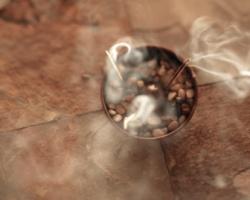Have you ever wondered if you could pass God’s smell test? Did you know He had a smell test?
Follow your nose through the passages below. Each time you see a reference to smell, note who is doing the smelling and what’s being smelled.
The First Smell
“Then Noah built an altar to the Lord and, taking some of all the clean animals and clean birds, he sacrificed burnt offerings on it. The Lord smelled the pleasing aroma and said in His heart: ‘Never again will I curse the ground because of humans, even though every inclination of the human heart is evil from childhood'” (
The First Smell Test
“Then burn the entire ram on the altar. It is a burnt offering to the Lord, a pleasing aroma, a food offering presented to the Lord” (
The New Covenant Smell
“Be kind and compassionate to one another, forgiving each other, just as in Christ God forgave you. Follow God’s example, therefore, as dearly loved children and walk in the way of love, just as Christ loved us and gave Himself up for us as a fragrant offering and sacrifice to God” (
The Use of Smell
“But thanks be to God, who always leads us as captives in Christ’s triumphal procession and uses us to spread the aroma of the knowledge of Him everywhere. For we are to God the pleasing aroma of Christ among those who are being saved and those who are perishing” (
So how do we create a good smell for God, and in turn, be used by God to spread the aroma of Christ? The answer is simple: sacrifice.
However, it’s very directed sacrifice, occurring inside the confines of the body of believers. The sacrifices of Israel in the Old Testament that created a fragrant aroma to God were done on behalf of the community, God’s people. As they followed the law of sacrifice, they were a sweet aroma to God, chiefly because they were useable, able to show off their great God to the surrounding nations (
The sacrifices in Ephesians 4:32—5:2 are directed toward the interaction between believers. Admittedly, it’s counterintuitive to think inside the church walls instead of outside.
Think about a fragrant flower. A flower must sacrifice a portion of its photosynthetic energy to create fragrance. This, in turn, is how that flower survives in that the fragrance attracts the pollinators (e.g., bees) that carry the pollen from plant to plant. (Who said you’d never use fifth grade science!?) If all the flowers of a species were to use all their energy for other functions such as growth and bloom development, the species would have one generation of large, pretty flowers…and then become extinct.
Much of the New Testament focuses on the interaction between members of the body of Christ; most of this interaction involves sacrifice. As with a plant, we could divert our energies toward other functions such as growth and appearance, but it’s a sweet fragrance that God is best able to use. Look at your congregants, especially teens and fellow youth workers. This is where your sacrifice starts. If you need a jumpstart, see
Let the smell test begin, and see what your fragrant aroma attracts.




